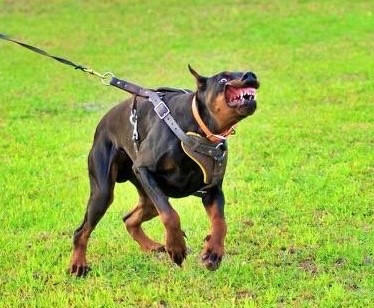No, of course not, neither are all German Shepherds or Belgian Malinois or Rottweilers or Mastiffs and so forth…
The Doberman Pinscher, with its sleek appearance and alert demeanor, is often hailed as a symbol of strength and protection. Renowned for their loyalty and intelligence, these dogs are frequently chosen as guard dogs or police canines. However, the notion that all Dobermans are natural protectors is a misconception. In this article, we will delve into the factors that contribute to the varying protective instincts in Dobermans and explore why not all of them exhibit this characteristic.
1. **Breed Variability:**
One of the fundamental reasons why not all Dobermans are natural protectors lies in the inherent variability within the breed. Dobermans, like any other breed, exhibit a range of personalities and temperaments. While some individuals may possess strong protective instincts, others may be more laid-back or even reserved. This variability is influenced by genetic factors, upbringing, and the specific lineage of the dog.
2. **Genetic Influences:**
Genetics plays a significant role in shaping a Doberman’s temperament. Despite the breed’s reputation for being protective, individual dogs may inherit a range of traits from their parents. Some Dobermans may have a predisposition towards protection due to selective breeding practices, while others may not possess the same genetic inclination. Understanding the genetic makeup of a Doberman is crucial in predicting their potential as protectors.
3. **Socialization and Training:**
The upbringing and training of a Doberman play a pivotal role in determining its protective instincts. Dogs that receive early and consistent socialization are more likely to develop a balanced temperament. On the other hand, a lack of socialization or improper training may result in timid or fearful behavior, hindering their ability to be effective protectors. Positive reinforcement and exposure to various environments are essential components of fostering a Doberman’s protective instincts.
4. **Individual Personality:**
Just like humans, each Doberman has its own unique personality. While the breed may be generally known for its protective nature, individual variations can be attributed to factors such as life experiences, environmental influences, and the dog’s overall temperament. Some Dobermans may naturally lean towards a protective role, while others may exhibit a more independent or friendly disposition.
In conclusion, it is essential to dispel the myth that all Dobermans are natural protectors. The breed’s variability, genetic influences, socialization and training, individual personality, and health factors all contribute to the unique temperament of each dog. By understanding and respecting these factors, dog owners can better appreciate the diverse range of personalities within the Doberman breed and work towards nurturing the qualities that align with their individual expectations and needs. One thing is for sure, where your particular Doberman is suitable for protection or more as a pet, their looks alone are enough to intimidate and deter.


